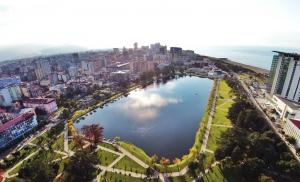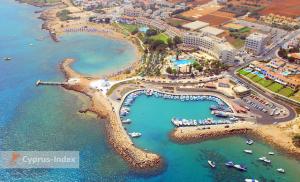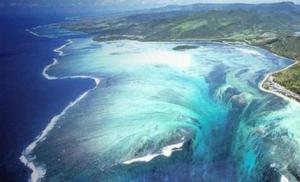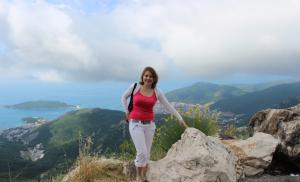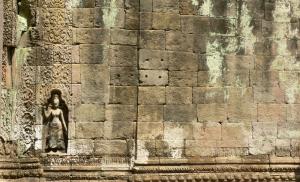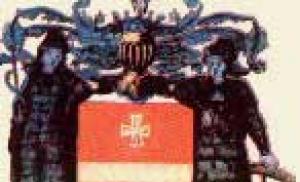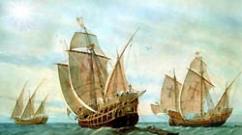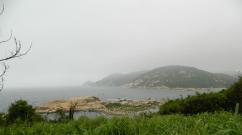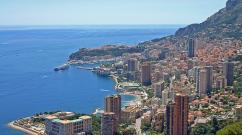Rest in Kastropol (Beregovoe). Beregovoe (Yalta) By bus, trolleybus and minibus
It is not clear who came up with the idea to rename the sonorous Greek Kastropol to Beregovoye, but in the end Crimea received a third village with that name. There are already two on the peninsula: one in Western Crimea on the shore of the Kalamitsky Gulf, the other in the Vostochny, on the shore of the Feodosia Gulf.
The Crimeans themselves still call Beregovoye South Coast - Kastropol, and this name has been preserved at the Yalta highway stop and is printed on tickets for public transport. In the text, in order to avoid confusion, we will also call it by this old sonorous name.
Rest in Kastropol (Beregovoe)
Now this urban village is a popular southern coastal resort, which can be accessed from the highway in two places. Along one road you will get to the upper Kastropol, where the local population mainly lives, and along the other to the lower one, more designed for vacationers. The whole territory is quite a steep slope, surrounded by greenery, and therefore looks very picturesque. The roads are narrow, descending to the sea in serpentines, but unlike neighboring settlements, there are quite a few cars here, even at the height of the season. Therefore, if you prefer a relaxing beach holiday, then choose this village.
Housing in Kastropol
There are many options. These are sanatoriums, hotels, boarding houses and private sector, from guest houses and mini-hotels to turnkey rooms and apartments. Housing in upper Kastropol is noticeably cheaper because it is located further from the sea. You will have to walk about a kilometer to get there on foot, or almost three by car.
In lower Kastropol, the price range is also quite significant; there are options for poor students and for those who are used to relaxing in comfort. There are a lot of reviews on the Internet about holidays in Kastropol, be guided by them. A few words about the boarding house "Kastropol": for those who feel nostalgia for the Soviet past, it is an ideal option. Here it has been preserved so much that it resembles a walk in a time machine. Everything is identical - life, food, attitude of the staff.
If you are going here on holiday during the high season, be sure to book your accommodation in advance. In early June and September, it’s easy to rent a room even right next to the sea.

History of Kastropol
They lived here from time immemorial and called their settlement Kastropulo, that is, fortress. They fished, grew grapes, olives and even grains, which you can’t find on the South Coast now. Gradually the village grew richer, passing either into the hands of Chersonese or under the Roman or Bosporan protectorate. Only after the arrival of the Turks did the people begin to become poor; Orthodox rituals were celebrated secretly - in a cave above Muholatka. Therefore, the Greeks moved from here to the Mariupol steppes at the first opportunity.
Soon after joining Russia, Nikolai Nikitich Demidov bought these lands, planted extensive vineyards here, engaged in winemaking himself, and then his heirs. At the beginning of the 20th century, the upper part of the village belonged to engineers from Moscow, the Pervushin brothers, and the lower part belonged to the St. Petersburg manufacturer E.N. Peltzer. In 1903, the writer N. Garin-Mikhailovsky lived at the Pervushins’ Kastropol dacha, whose research became the basis for the project of a new Sevastopol-Yalta highway (Now a memorial plaque at the site reminds of this). Here he wrote his story “Engineers” - almost documentary evidence of how agricultural and feudal Russia turned into a modern industrial power.

IN Soviet era rich houses became state property and served as sanatoriums and rest homes for ordinary people. During the Great Patriotic War, German fascists were based here. In the winter of 1941, a reconnaissance group made a noise here Black Sea Fleet under the command of F. Volonchuk, as recalled by the memorial plaque at the turn to Nizhny Kastropol.
Such popular films were partially filmed here. like "The Amphibian Man" and "The Prisoner of the Chateau d'If", the actors lived in the village.
Climate of Kastropol
The southern coast of Crimea is especially valued for its unique climate, reminiscent of the Mediterranean, and the microclimate of Kastropol is no exception. There are mild, humid winters and long, sunny summers, the heat of which is moderated by sea breezes. In June, the average daily air temperature is 20.2°C, in July it reaches 24°C, and in August just below 23°C. By mid-summer the water heats up to 25°C. You can swim from the first days of June until the end of September, and in some years until the end of October.

Sights of Kastropol
Despite the miniature size of the village, there are attractions in Kastropol. The main one offers a beautiful view of the sea and picturesque surroundings. The Church of the Kazan Icon of the Mother of God looks especially beautiful, immersed in greenery - white, elegant, with a golden dome. On the rock itself there is a cross in memory of Christians who, according to local legend, were once crucified here by the Romans. Not far away, above the neighboring village of Oliva, there is the Devil's Staircase pass, popular among tourists. You can also see the ruins of the Isar-Kaya fortress.
In general, the location of Kastropol is such that from here you can easily visit the main attractions of the South Coast - all the palaces, parks, museums, etc.

Entertainment in Kastropol
The village is small and quiet, so don’t expect any events, concerts or noisy discos here; you need to go to Yalta or Alushta for them. The main entertainments of Kastropol are beach holidays, hiking, excursions to interesting places Southern Crimea. Be sure to order sea excursion– The South Coast is incredibly beautiful from the sea.

Nutrition
You can immediately book accommodation with meals. This service is offered by both boarding houses and private owners. Moreover, it is not necessary to have three meals a day; you can agree on only breakfast or breakfast and dinner. There is also a cafe in the village; you can eat there, fortunately the prices are quite affordable. If you prefer to cook yourself, choose housing with a kitchen, buy food - there are shops and a small market in the village and cook. Black Sea fish is also sold, right on the beach or at the local market.
How to get to Kastropol
Buses do not go to the village itself, but to stops on the highway: “Upper Kastropol” or “Lower Kastropol”. Having exited at the first one, you will find yourself two steps from the upper part of the settlement; it will take you about 15 minutes to get to the lower part. From the second stop, after 10-12 minutes, the serpentine road will lead directly to the lower part of the village. Any public transport that goes along the Sevastopol-Yalta highway will suit you. Even if the stop is not indicated on the ticket, the driver will drop you off at the right place.
Kastropol. General information
Since 1971, the village has been officially named Beregovoe, although no one calls it that, except in official documents - only Kastropol. Even two beautiful stopping complexes bear the names “Upper Kastropol” and “Lower Kastropol”.
Conventionally, Castropol is divided into two parts - the Upper, more precisely northwestern, and the Lower, southeastern. Upper Kastropol is sparsely populated; it consists of a steep bank topped with the Iphigenia rock and a forest above, making this part of the village attractive for luxury development. Not far from the Iphigenia rock, a wild tourist camp opens every summer in a young coniferous forest.
In Upper Kastropol there is the Temple of the Kazan Icon of the Mother of God, built in 2010. New Temple fit harmoniously into the local landscape. Tourists use its terraces as observation platforms, from which a stunning view of Castropolis, the sea and the Iphigenia rock opens. This temple has two altars. The upper one is dedicated to the Kazan Icon of the Mother of God, the lower one - to St. George the Victorious, and the latter was consecrated quite recently - in 2015.

|

|
Lower Kastropol is more reminiscent of a modern resort. There is a good small pebble beach here, open to the public. Numerous shopping establishments and cafeterias operate on the embankment in summer. favorite place for walks for vacationers both in the private sector and in the Kastropol boarding house. This large boarding house occupies most of Lower Kastropol. It will be discussed below.
The northern part of Kastropol is simply surrounded by greenery. It is impossible to see anything from the highway, not even a rather large boarding house. A road leads from the Yalta-Sevastopol highway to Nizhny Kastropol - a rather winding serpentine road. This route allows you to explore the entire territory of the Kastropol boarding house before it leads to the embankment.

|

|
| View towards Foros from the Kastropol embankment | Merdven-Kayasy, view from the Upper Kastropol stop |
If you look at Kastropol as an entire village, then in general terms the following can be said about it. It is located between the village of Parkovoe in the east and state dachas No. 6 and No. 9 in the west. Between Upper Kastropol and the sea there are closed private buildings, which are clearly visible in detail from the Iphigenia rock. On the Parkovy side, first of all, the traveler will again encounter fences - there is a closed recreation center “Zhukovka”. Among the abundance of fences, the long and wide central beach of Kastropol attracts relaxation.
All western part The embankment of Kastropol is so littered with stones that only savages camped higher up in tents risk resting and swimming here. The village itself does not give the impression of being overloaded with vacationers.
Kastropol gave its name to the rocky wall located directly above the village. Height highest point Kastropol wall, also called Mount Kastropol - 955 meters.

|

|
| View of the Kastropol Wall from the church |
View from Iphigenia Rock to the church and mountains |
Besides being memorable, .com domains are unique: This is the one and only .com name of its kind. Other extensions usually just drive traffic to their .com counterparts. To learn more about premium .com domain valuations, watch the video below:
Turbocharge your Web site. Watch our video to learn how.
Improve Your Web Presence
Get noticed online with a great domain name
73% of all domains registered on the Web are .coms. The reason is simple: .com is the where most of Web traffic happens. Owning a premium .com gives you great benefits including better SEO, name recognition, and providing your site with a sense of authority.
Here's What Others Are Saying
Since 2005, we"ve helped thousands of people get the perfect domain name
- Purchasing domain name from hugedomains.com is convenient and secure. Highly recommended to premium domain name purchasers. - Lily, 11/7/2019
- I was interested in this domain for a little while before deciding to purchase it. I looked it up several times and was always directed to one of Huge Domains competitors. I found Huge Domains kind of by accident while doing a little research. I found their price to be a small fraction of the other guys and that prompted me to do a lot more research. What I found with Huge Domains was a company I felt comfortable doing business with. I didn’t find any fine print, additional fees or a reason to believe the price was to good to be true. I’m recommending Huge Domains to anyone who could benefit from their services. - Brian Mcintosh, 11/5/2019
- I called HugeDomains and negotiated a price over the phone. Easy process and no pressure at all. - John Ball, 11/5/2019
- More
Republic of Crimea: RUS 82
AR Crimea: AK, KK / 01
Beregovoe |
Beregovoe(until 1971 Kastropol; Ukrainian Beregovo, Crimean Tat. Kastropol, Kastropol) - an urban-type settlement in Crimea, part of the Yalta urban district (Simeiz village council of the Yalta city council).
Population
Geography
The resort area is protected by the Main Ridge of the Crimean Mountains from the cold north-eastern and northern winds. Rich natural vegetation(coniferous and deciduous species) combined with parklands; Evergreen trees and shrubs predominate.
The village is divided into two historically formed parts: Upper Kastropol, located to the west, and Nizhny Kastropol or simply Kastropol, located to the east.
Upper Kastropol and Iphigenia rock
In Upper Kastropol there is a residential one-story estate building, a large VIP residence, and an Orthodox church built in 2010, consecrated in honor of the Kazan Icon of the Mother of God. Near the temple there is mineral spring.
Below the level of the buildings of Upper Kastropol above the sea is located rock Iphigenia. mountain range 120 m high and 450 m long along the sea edge, it is a cape separating Kastropol from the village of Oliva. The base of the rock is a volcanic cone composed of deposits of volcanic ash (tuffs) with inclusions of volcanic bombs dating back to the volcanism of the Upper Jurassic period (150 million years ago). The rock massif is divided by a steep gorge-fault into two parts - the eastern, called Iphigenia proper, and the western, also known as Dragon rock; the top of the latter is covered with characteristic stone peaks.
There is an Orthodox cross on the eastern top of the rock. A turn of the Upper Kastropol serpentine approaches the slope of the eastern peak of Iphigenia at level 50 below its highest point from the rear (relative to the sea) side.
The name of the rock is associated with the myth of Iphigenia in Tauris and was assigned to the rock by the owner of the estate N. N. Demidov in the 1820s.
Lower Kastropol and forest zone
In Nizhny Kastropol there is a private development, as well as a seaside resort area. This zone consists of a group of buildings of the Kastropol boarding house, several hotels and mini-hotels.
In addition, between Lower and Upper Kastropol there is a kilometer-long zone of forest of the sub-Mediterranean type. In the forest zone grow Crimean pine, Scots pine, blunt-leaved pistachio, thorny tree, evergreen cypress, common juniper, Cossack juniper, Crimean cistus, Pontian butcher's broom, etc.
Story
Ancient history
According to legends recorded by local residents at the end of the 19th century, before the creation of the fortress, approximately in the 7th-10th centuries, an Orthodox monastery was located near the Iphigenia rock. The same legend claimed that the monastery was dedicated to the memory of martyrs crucified on this rock to intimidate sailors around the 3rd century. n. e. by Roman authorities during the persecution of Christians. No documentary or material evidence of this legend has yet been found. However, it was she who served as the basis for the construction of the current cross on top of the Iphigenia rock.
In 1873, Crimean local historian Vasily Kondaraki wrote:
Kastropulo is one of the best estates here due to its proximity to the sea, the beauty of the location and the quality of the land for vineyards. There is no doubt that there was once a fairly significant settlement of the ancient Greeks here. Proof of this, in addition to the name indicating the existence of a fortress in it, are the traces of a fortification noticed by Academician Köppen on a rock approaching the sea itself and the discovery in the ground of clay amphorae or enormous jugs in which the ancients preserved their wines. Residents of the former Tatar settlement of Mikhalatki, who have now moved to Turkey, told me that according to the legend passed down to them from their fathers, Kastropulo was abandoned by the Greeks at the time when Christians left the Crimean Khanate for the Mariupol steppes; that this settlement was extensive before Turkish rule on the southern coast, but subsequently, when the Turkish agi began to treat them cruelly and interfere with the free exercise of worship, the oppressed could only pray in a cave and were glad to leave their homeland at the first opportunity. According to the same Tatars, the surroundings of Kastropulo under the Greeks were incomparably richer in all kinds of vegetation and abounded in grain grain, which is no longer sown here at present. From them I also learned that the cave that served as the Temple of the unfortunate Christians and to this day presents traces consistent with legend, and is located in the rock opposite the villages of Mikhalatki and Kuchuk-koya, located a short distance from Kastropulo.
Russian Empire period
On the military topographical map of Major General Mukhin in 1817, the tract is also simply indicated Castrop. In 1823, the Kastropulo estate was acquired by a representative of one of the richest families in Russia - Nikolai Nikitich Demidov - with the aim of turning it into an “economy” (a separate economic unit) of experimental viticulture. To save money, in a short time more than 20 thousand vines of French and Spanish origin were planted, wine cellars were dug into the slopes, and mass production of barrels was established.
After the death of N. N. Demidov (1828) Kastropulo was the joint estate of his sons-philanthropists - Kursk governor Pavel Nikolaevich Demidov and Anatoly Nikolaevich Demidov (Prince San Donato). In 1837, Kastropulo was visited by the natural history expedition of Anatoly Demidov (the group of scientists was led by a professor at the Paris Mining school F. Le-Ple), who left brief description savings By personal decree of Nicholas I of March 23 (old style), 1838, on April 15, a new Yalta district was formed and the village was transferred to the Derekoi volost. On the map of 1842, Kastropol is indicated by the conventional sign “small village”, that is, less than 5 households.
According to the division of the Demidovs' property in 1861, Kastropulo went to the son of P.N. Demidov - Pavel Pavlovich Demidov (Prince San Donato), later the mayor of Kyiv. According to “List of populated places of the Tauride province according to information from 1864”, compiled based on the results of the VIII audit of 1864, Kastropol is a proprietary Russian economy, with 1 courtyard and 7 inhabitants, at the Kuyme stream. On three-verst on the map of 1865-1876, small villages are indicated separately Kostropol and Demidov's dacha.
In 1873, P. P. Demidov-San Donato sold Castropulo to the Russian diplomat Baron Karl Karlovich Toll, who transferred the estate to his daughter Margarita (in marriage - Izvolskaya). After this, the name of the village of Kastropulo was transformed into Kastropol by analogy with urban names of Greek origin common in the southern Russian region. On verst On the map of 1889-1890, the Nizhny Kastropol estate is indicated on the site of Beregovoy.
In 1882-1892, Marfa Sabinina, the organizer of one of the first Communities of Sisters of Charity in Russia, lived the last years of her life on the Kastropol estate of Baroness M.K. Toll; Here she wrote autobiographical “Notes”. In those same years, M. Sabinina’s friend and colleague in charity matters, the maid of honor of the imperial court, Baroness Maria Fredericks, often visited Castropol. On the initiative of M. Sabinina, at the expense of M. Fredericks, a portable Orthodox church was built and consecrated in Kastropol (soon, however, moved by the will of the patrons themselves to Feodosia, where it served as the basis for the construction of the Kazan Cathedral).
In 1924, on the site of most of the estate and park of D. Pervushin’s estate, two sanatoriums for teachers were created. In 1960] they were united into the boarding house "Kastropol". According to List settlements Crimean ASSR according to the All-Union Census of December 17, 1926, as part of the Kikineiz village council of the Yalta region, there were two farms: Kastropol with 19 courtyards, of which 5 were peasants, the population was 36 people, of which 32 Russians, 31 Crimean Tatars, 1 Ukrainian and Kastropol Nizhny (3 courtyards, 11 Russian residents).
An episode of the Great Patriotic War is associated with Upper Kastropol. In December 1941, here, on German-occupied territory, a reconnaissance group of sailors from the Soviet Black Sea Fleet under the command of midshipman F. Volonchuk landed and operated. In memory of this raid, a memorial plaque was installed on the slope-reinforcing slope of the Yalta-Sevastopol highway near the turn to Nizhny Kastropol in May 1978.
In 1960, one of the filming locations for the film “Amphibian Man” was located in Kastropol - V. Korenev, Anastasia Vertinskaya and other artists worked here. In 1986, part of the filming of the film “The Prisoner of the Chateau d'If” took place under the slope of the Iphigenia rock - V. Avilov, E. Dvorzhetsky, M. Boyarsky, G. Yungvald-Khilkevich and other filmmakers worked here.
After tea, the company moved to the sofa room, and the princess was asked to play the clavichord. Anatole leaned his elbows in front of her next to M lle Bourienne, and his eyes, laughing and rejoicing, looked at Princess Marya. Princess Marya felt his gaze on her with painful and joyful excitement. Her favorite sonata transported her to the most sincerely poetic world, and the gaze she felt on herself made this world even more poetic. Anatole’s gaze, although fixed on her, did not refer to her, but to the movements of m lle Bourienne’s leg, which at that time he was touching with his foot under the piano. M lle Bourienne also looked at the princess, and in her beautiful eyes there was also an expression of frightened joy and hope, new to Princess Marya.
“How she loves me! - thought Princess Marya. – How happy I am now and how happy I can be with such a friend and such a husband! Is it really a husband? she thought, not daring to look at his face, feeling the same gaze directed at herself.
In the evening, when they began to leave after dinner, Anatole kissed the princess’s hand. She herself did not know how she got the courage, but she looked directly at the beautiful face approaching her myopic eyes. After the princess, he approached M lle Bourienne’s hand (it was indecent, but he did everything so confidently and simply), and M lle Bourienne flushed and looked at the princess in fear.
“Quelle delicatesse” [What delicacy,] thought the princess. – Does Ame (that was the name of m lle Bourienne) really think that I can be jealous of her and not appreciate her pure tenderness and devotion to me? “She went up to M lle Bourienne and kissed her deeply. Anatole approached the little princess's hand.
- Non, non, non! Quand votre pere m"ecrira, que vous vous conduisez bien, je vous donnerai ma main a baiser. Pas avant. [No, no, no! When your father writes to me that you are behaving well, then I will let you kiss your hand. Not before.] – And, raising her finger and smiling, she left the room.
Everyone left, and, except for Anatole, who fell asleep as soon as he lay down on the bed, no one slept for a long time that night.
“Is he really my husband, this strange, handsome, kind man; the main thing is to be kind,” thought Princess Marya, and fear, which almost never came to her, came over her. She was afraid to look back; it seemed to her that someone was standing here behind the screens, in a dark corner. And this someone was he - the devil, and he - this man with a white forehead, black eyebrows and a ruddy mouth.
She called the maid and asked her to lie down in her room.
M lle Bourienne walked around the winter garden for a long time that evening, waiting in vain for someone and then smiling at someone, then being moved to tears by the imaginary words of pauvre mere, reproaching her for her fall.
The little princess grumbled at the maid because the bed was not good. She was not allowed to lie on her side or on her chest. Everything was difficult and awkward. Her stomach was bothering her. He bothered her more than ever, just now, because Anatole’s presence transported her more vividly to another time, when this was not the case and everything was easy and fun for her. She was sitting in a blouse and cap on an armchair. Katya, sleepy and with a tangled braid, interrupted and turned over the heavy feather bed for the third time, saying something.
“I told you that everything is lumps and pits,” the little princess repeated, “I would be glad to fall asleep myself, so it’s not my fault,” and her voice trembled, like that of a child about to cry.
The old prince also did not sleep. Through his sleep, Tikhon heard him walking angrily and snorting through his nose. It seemed to the old prince that he was insulted on behalf of his daughter. The insult is the most painful, because it did not apply to him, but to someone else, to his daughter, whom he loves more than himself. He told himself that he would change his mind about this whole matter and find what was fair and should be done, but instead he only irritated himself more.
“The first person he meets appears - and father and everything are forgotten, and runs upstairs, combs his hair and wags his tail, and doesn’t look like himself! Glad to leave my father! And she knew that I would notice. Fr... fr... fr... And don’t I see that this fool only looks at Burienka (we need to drive her away)! And how there is no pride enough to understand this! At least not for myself, if there is no pride, then for me, at least. We need to show her that this idiot doesn’t even think about her, but only looks at Bourienne. She has no pride, but I will show her this”...
Having told his daughter that she was mistaken, that Anatole intended to court Bourienne, the old prince knew that he would irritate Princess Marya’s pride, and his case (the desire not to be separated from his daughter) would be won, and therefore he calmed down on this. He called Tikhon and began to undress.
“And the devil brought them! - he thought while Tikhon covered his dry, senile body, overgrown with gray hair on his chest, with his nightgown. – I didn’t call them. They came to upset my life. And there’s a little of it left.”
- To hell! - he said while his head was still covered with his shirt.
Tikhon knew the prince’s habit of sometimes expressing his thoughts out loud, and therefore, with an unchanged face, he met the questioningly angry look of the face that appeared from under his shirt.
- Have you gone to bed? - asked the prince.
Tikhon, like all good lackeys, knew by instinct the direction of the master’s thoughts. He guessed that they were asking about Prince Vasily and his son.
“We deigned to lie down and put out the fire, your Excellency.”
“No reason, no reason...” the prince said quickly and, putting his feet into his shoes and his hands into his robe, went to the sofa on which he was sleeping.
Despite the fact that nothing was said between Anatole and m lle Bourienne, they completely understood each other regarding the first part of the novel, before the appearance of pauvre mere, they realized that they had a lot to say to each other secretly, and therefore in the morning they looked for an opportunity see you alone. While the princess went to her father at the usual hour, m lle Bourienne met with Anatole in the winter garden.
Princess Marya approached the office door that day with special trepidation. It seemed to her that not only did everyone know that her fate would be decided today, but that they also knew what she thought about it. She read this expression in Tikhon’s face and in the face of Prince Vasily’s valet, who met the hot water in the corridor and bowed low to her.
The old prince that morning was extremely affectionate and diligent in his treatment of his daughter. Princess Marya knew this expression of diligence well. This was the expression that happened on his face in those moments when his dry hands clenched into a fist out of frustration because Princess Marya did not understand the arithmetic problem, and he, getting up, walked away from her and in a quiet voice repeated the same words several times. the same words.
He immediately got down to business and started the conversation by saying “you.”
“They made me a proposition about you,” he said, smiling unnaturally. “I think you guessed,” he continued, “that Prince Vasily came here and brought with him his pupil (for some reason Prince Nikolai Andreich called Anatoly his pupil) not for my beautiful eyes.” Yesterday they made a proposition about you. And since you know my rules, I treated you.
– How should I understand you, mon pere? - said the princess, turning pale and red.
- How to understand! – the father shouted angrily. “Prince Vasily finds you to his liking for his daughter-in-law and makes a proposal to you for his pupil. Here's how to understand it. How to understand?!... And I’m asking you.
“I don’t know how you are, mon pere,” the princess said in a whisper.
- I? I? what am I doing? Leave me aside. I'm not the one getting married. What do you? This is what it would be good to know.
The princess saw that her father looked at this matter unkindly, but at that very moment the thought came to her that now or never the fate of her life would be decided. She lowered her eyes so as not to see the gaze, under the influence of which she felt that she could not think, but could only obey out of habit, and said:
“I wish only one thing - to fulfill your will,” she said, “but if my desire had to be expressed...
She didn't have time to finish. The prince interrupted her.
“And wonderful,” he shouted. - He will take you with a dowry, and by the way, he will capture m lle Bourienne. She will be the wife, and you...
The prince stopped. He noticed the impression these words made on his daughter. She lowered her head and was about to cry.
“Well, well, just kidding, just kidding,” he said. “Remember one thing, princess: I adhere to the rules that a girl has every right to choose.” And I give you freedom. Remember one thing: the happiness of your life depends on your decision. There's nothing to say about me.
- Yes, I don’t know... mon pere.
- Nothing to say! They tell him, he doesn’t just marry you, whoever you want; and you are free to choose... Go to your place, think it over and in an hour come to me and say in front of him: yes or no. I know you will pray. Well, maybe pray. Just think better. Go. Yes or no, yes or no, yes or no! - he shouted even as the princess, as if in a fog, staggered out of the office.
Her fate was decided and decided happily. But what my father said about m lle Bourienne - this hint was terrible. It’s not true, let’s face it, but it was still terrible, she couldn’t help but think about it. She walked straight ahead through the winter garden, seeing and hearing nothing, when suddenly the familiar whisper of M lle Bourienne woke her up. She raised her eyes and, two steps away, saw Anatole, who was hugging the Frenchwoman and whispering something to her. Anatole, with a terrible expression on his beautiful face, looked back at Princess Marya and did not release the waist of m lle Bourienne, who did not see her, at the first second.
“Who's there? For what? Wait!" Anatole’s face seemed to speak. Princess Marya looked at them silently. She couldn't understand it. Finally, M lle Bourienne screamed and ran away, and Anatole bowed to Princess Marya with a cheerful smile, as if inviting her to laugh at this strange case, and, shrugging his shoulders, walked through the door that led to his half.
An hour later Tikhon came to call Princess Marya. He called her to the prince and added that Prince Vasily Sergeich was there. The princess, when Tikhon arrived, was sitting on the sofa in her room and holding the crying Mlla Bourienne in her arms. Princess Marya quietly stroked her head. The beautiful eyes of the princess, with all their former calm and radiance, looked with tender love and regret at the pretty face of m lle Bourienne.
“Non, princesse, je suis perdue pour toujours dans votre coeur, [No, princess, I have lost your favor forever,” said m lle Bourienne.
– Pourquoi? “Je vous aime plus, que jamais,” said Princess Marya, “et je tacherai de faire tout ce qui est en mon pouvoir pour votre bonheur.” [Why? I love you more than ever, and I will try to do everything in my power for your happiness.]
– Mais vous me meprisez, vous si pure, vous ne comprendrez jamais cet egarement de la passion. Ah, ce n "est que ma pauvre mere... [But you are so pure, you despise me; you will never understand this passion of passion. Ah, my poor mother...]
“Je comprends tout, [I understand everything,”] answered Princess Marya, smiling sadly. - Calm down, my friend. “I’ll go to my father,” she said and left.
Prince Vasily, bending his leg high, with a snuffbox in his hands and as if extremely emotional, as if he himself was regretting and laughing at his sensitivity, sat with a smile of tenderness on his face when Princess Marya entered. He hurriedly brought a pinch of tobacco to his nose.
“Ah, ma bonne, ma bonne, [Ah, darling, darling.],” he said, standing up and taking her by both hands. He sighed and added: “Le sort de mon fils est en vos mains.” Decidez, ma bonne, ma chere, ma douee Marieie qui j"ai toujours aimee, comme ma fille. [The fate of my son is in your hands. Decide, my dear, my dear, my meek Marie, whom I have always loved like a daughter. ]
He walked away. A real tear appeared in his eyes.
“Fr... fr...” Prince Nikolai Andreich snorted.
- The prince, on behalf of his pupil... son, makes a proposition to you. Do you want or not to be the wife of Prince Anatoly Kuragin? You say yes or no! - he shouted, - and then I reserve the right to say my opinion. Yes, my opinion and only my opinion,” added Prince Nikolai Andreich, turning to Prince Vasily and responding to his pleading expression. - Yes or no?
– My desire, mon pere, is never to leave you, never to separate my life from yours. “I don’t want to get married,” she said decisively, looking with her beautiful eyes at Prince Vasily and her father.
- Nonsense, nonsense! Nonsense, nonsense, nonsense! - Prince Nikolai Andreich shouted, frowning, took his daughter by the hand, bent her to him and did not kiss her, but only bending his forehead to her forehead, he touched her and squeezed the hand he was holding so much that she winced and screamed.
Prince Vasily stood up.
– Ma chere, je vous dirai, que c"est un moment que je n"oublrai jamais, jamais; mais, ma bonne, est ce que vous ne nous donnerez pas un peu d"esperance de toucher ce coeur si bon, si genereux. Dites, que peut etre... L"avenir est si grand. Dites: peut etre. [My dear, I will tell you that I will never forget this moment, but, my dearest, give us at least a small hope of being able to touch this heart, so kind and generous. Say: maybe... The future is so great. Say: maybe.]
- Prince, what I said is everything that is in my heart. I thank you for the honor, but I will never be your son's wife.
- Well, it’s over, my dear. Very glad to see you, very glad to see you. Come to yourself, princess, come,” said the old prince. “I’m very, very glad to see you,” he repeated, hugging Prince Vasily.
“My calling is different,” Princess Marya thought to herself, my calling is to be happy with another happiness, the happiness of love and self-sacrifice. And no matter what it costs me, I will make poor Ame happy. She loves him so passionately. She repents so passionately. I will do everything to arrange her marriage with him. If he is not rich, I will give her money, I will ask my father, I will ask Andrey. I will be so happy when she becomes his wife. She is so unhappy, a stranger, lonely, without help! And my God, how passionately she loves, if she could forget herself like that. Maybe I would have done the same!...” thought Princess Marya.
For a long time the Rostovs had no news about Nikolushka; Only in the middle of winter was a letter given to the count, at the address of which he recognized his son’s hand. Having received the letter, the count, frightened and hasty, trying not to be noticed, ran on tiptoe into his office, locked himself and began to read. Anna Mikhailovna, having learned (as she knew everything that was happening in the house) about the receipt of the letter, quietly walked into the count’s room and found him with the letter in his hands, sobbing and laughing together. Anna Mikhailovna, despite the improvement in her affairs, continued to live with the Rostovs.
- Mon bon ami? – Anna Mikhailovna said inquiringly, sadly and with a readiness for any kind of participation.
The Count began to cry even more. “Nikolushka... letter... wounded... would... be... ma сhere... wounded... my darling... countess... promoted to officer... thank God... How can I tell the countess?...”
Anna Mikhailovna sat down next to him, wiped away the tears from his eyes, from the letter they had dripped, and her own tears with her handkerchief, read the letter, reassured the count and decided that before lunch and tea she would prepare the countess, and after tea she would announce everything, if God will help her.
Throughout dinner, Anna Mikhailovna talked about rumors of war, about Nikolushka; I asked twice when the last letter from him was received, although I knew this before, and noticed that it would be very easy, perhaps, to receive a letter today. Every time at these hints the countess began to worry and look anxiously, first at the count, then at Anna Mikhailovna, Anna Mikhailovna most imperceptibly reduced the conversation to insignificant subjects. Natasha, of the whole family, most gifted with the ability to sense shades of intonation, glances and facial expressions, from the beginning of dinner her ears pricked up and knew that there was something between her father and Anna Mikhailovna and something concerning her brother, and that Anna Mikhailovna was preparing. Despite all her courage (Natasha knew how sensitive her mother was to everything related to the news about Nikolushka), she did not dare to ask questions at dinner and, out of anxiety, ate nothing at dinner and spun around in her chair, not listening to her governess’s comments. After lunch, she rushed headlong to catch up with Anna Mikhailovna and in the sofa room, with a running start, threw herself on her neck.
- Auntie, my dear, tell me, what is it?
- Nothing, my friend.
- No, darling, darling, honey, peach, I won’t leave you behind, I know you know.
Anna Mikhailovna shook her head.
“Voua etes une fine mouche, mon enfant, [You are a delight, my child.],” she said.
- Is there a letter from Nikolenka? Maybe! – Natasha screamed, reading the affirmative answer in Anna Mikhailovna’s face.
- But for God's sake, be careful: you know how this can affect your maman.
- I will, I will, but tell me. Won't you tell me? Well, I’ll go and tell you now.
Anna Mikhailovna in in short words told Natasha the contents of the letter with the condition not to tell anyone.
“Honest, noble word,” Natasha said, crossing herself, “I won’t tell anyone,” and immediately ran to Sonya.
“Nikolenka... wounded... letter...” she said solemnly and joyfully.
- Nicolas! – Sonya just said, instantly turning pale.
Natasha, seeing the impression made on Sonya by the news of her brother’s wound, felt for the first time the whole sad side of this news.
She rushed to Sonya, hugged her and cried. – A little wounded, but promoted to officer; “He’s healthy now, he writes himself,” she said through tears.
“It’s clear that all of you women are crybabies,” said Petya, walking around the room with decisive big steps. “I am so very glad and, truly, very glad that my brother distinguished himself so much.” You are all nurses! you don't understand anything. – Natasha smiled through her tears.
-Have you not read the letter? – Sonya asked.
– I didn’t read it, but she said that everything was over, and that he was already an officer...
“Thank God,” said Sonya, crossing herself. “But maybe she deceived you.” Let's go to maman.
Petya walked silently around the room.
“If I were Nikolushka, I would kill even more of these French,” he said, “they are so vile!” I would beat them so much that they would make a bunch of them,” continued Petya.
- Shut up, Petya, what a fool you are!...
“I’m not a fool, but those who cry over trifles are fools,” said Petya.
– Do you remember him? – after a minute of silence Natasha suddenly asked. Sonya smiled: “Do I remember Nicolas?”
“No, Sonya, do you remember him so well that you remember him well, that you remember everything,” Natasha said with a diligent gesture, apparently wanting to attach the most serious meaning to her words. “And I remember Nikolenka, I remember,” she said. - I don’t remember Boris. I don't remember at all...
- How? Don't remember Boris? – Sonya asked in surprise.
“It’s not that I don’t remember, I know what he’s like, but I don’t remember it as well as Nikolenka.” Him, I close my eyes and remember, but Boris is not there (she closed her eyes), so, no - nothing!
“Ah, Natasha,” said Sonya, looking enthusiastically and seriously at her friend, as if she considered her unworthy to hear what she had to say, and as if she were saying this to someone else with whom one should not joke. “I once fell in love with your brother, and no matter what happens to him, to me, I will never stop loving him throughout my life.”
Natasha looked at Sonya in surprise and with curious eyes and was silent. She felt that what Sonya said was true, that there was such love as Sonya spoke about; but Natasha had never experienced anything like this. She believed it could be, but she didn't understand.
-Will you write to him? – she asked.
Sonya thought about it. The question of how to write to Nicolas and whether to write and how to write was a question that tormented her. Now that he was already an officer and a wounded hero, was it good of her to remind him of herself and, as it were, of the obligation that he had assumed in relation to her.
The southern coast of Crimea is still one of cultural centers, with beautiful architectural monuments, museums, roads laid by the Romans, an area with amazing diversity. The village of Beregovoe, better known as Kastropol, is divided into two parts: the upper one - residential with estate buildings and the lower one - the resort itself, where housing for vacationers is mainly offered. While relaxing in Beregovoe you will find little interesting: the Iphigenia rock, the Devil's Staircase pass, the Isar-Kaya fortress. There are also small cozy ones in Beregovoe pebble beaches. The resort is located almost in the center between Yalta and Sevastopol, the beach season lasts from June to September. This is a great place for beach holiday and educational tourism. Unique walking excursions in the Crimean Mountains begin from here; there are many rocks with varying levels of difficulty for lovers of rock climbing and extreme rope jumping, so a holiday in Beregovoe is suitable for everyone. Sea trips on a yacht, souvenir shops, and restaurants are at your service. Children will be delighted by the best water park in Crimea, “Blue Bay”, located ten kilometers away in the village of Simeiz. The clearest sea, rugged rocks, beautiful nature and the warm sun will give pleasure to everyone who pays attention to Kastropol resort.
